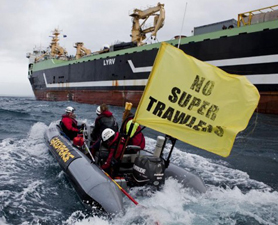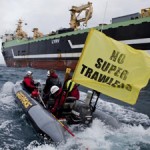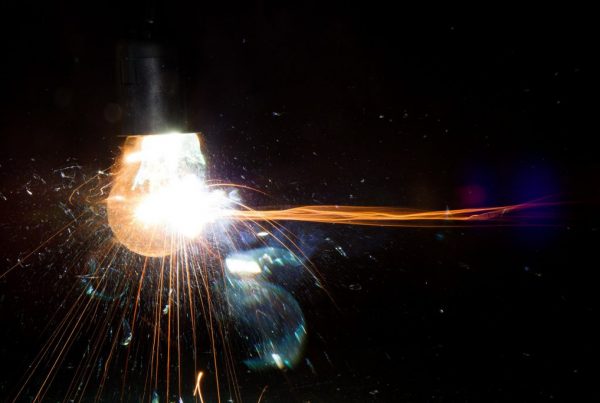A case study demonstrating the importance of Community Relations in Crisis PR.
From the public’s point-of-view we may have gone past the point of intelligent discussion about whether or not the giant trawler, Margiris, is going to damage Australia’s precious fish stocks. The company has lost the PR battle, and community trust, before it has started its harvest. It’s hard to regain public trust once it’s lost. The company is now relying on the government to impose restrictions to regain public trust, and so tying the government’s reputation into its own.
At fault is community relations, or lack of it. We’ve learnt from other experiences that biggest isn’t best. Because the Margiris is the ‘biggest’, the hurdle it has to jump before it gains public approval (the social license to operate) is the highest; people are naturally distrustful from the beginning.
It’s logical that Margiris will cause some depletion of fish stocks – more damage than a small trawler. Beyond that we have to try and divine the truth from the commentary.
And it will be hard now to change that public perception because the ship will become a symbol, a magnet for activists**; if Margiris fishes Australian waters it will shine a light on what is wrong with the way we harvest our oceans. This is the same with any other ‘biggest’. The biggest wind farm will always be the focus for activists concerned about the killing of birds by those giant blades; the biggest cotton farm will always be the focus for concerns about water-use efficiency; the biggest seabound sheep carrier will always be the target for concern about live sheep exports; the largest mine will always be the example used to illustrate what is wrong with mining; and so on. ‘Biggest’ creates story angles and headlines.
And the era has passed when we could argue with the claim that we need to trust ‘scientific facts’ over ‘activists’ misinformation’. The public has learnt that: scientists argue on each side of climate change and both sides have fibbed; scientists gave rise to BP’s deep-sea drilling platform in the Gulf of Mexico; scientists built and maintained the Fukushima power plant. In the case of the scientists supporting the Margiris, outsiders (the under-informed public) can’t tell whether their facts are promoting a fish harvest that is ‘probably environmentally tolerable’ or ‘definitely environmentally sustainable’.
The people who have brought Margiris to Australia seem to have adopted the crash or crash-through approach. It’s reminiscent of the behaviour of the Japanese whalers. The time for that kind of attitude has long since passed. These days people, rather than be told what they must accept, are expecting that a company will do what is required to become a part of a community; engage in a way that allows the community to be involved in at least some of the decisions. The best current example of how not to do this is the coal seam gas industry, which has also ‘told’ communities all over Australia how it will behave in their midst. And been rejected for their efforts with demonstrations up and down the east coast of Australia.
Back to Margiris. One scientist has complained, “Why has the government allowed the debate to become so far removed from science and logic?”. This is misplaced responsibility. Most politicians, when briefed on controversial projects, will ask a company, “Have you sorted your community relations?”, and the answer had better be yes. Community relations is the responsibility of the company. Look at the mess that had been created by lead-footed companies over the coal seam gas issue. No sensible politician is going to want to sort that out – although some now have to.
So, how should Margiris have been introduced into Australia? There are a variety of ways of engaging with communities, but the starting point is the company being aware that success or failure relies on being granted the social license to operate. That mindset is a big change from the traditional approach of simply asking governments for development approval, without community consultation.
There’s a good case study in an energy company we worked with. The company has the potential to be the biggest of its type in Australia, and under the right circumstance, a huge public asset. However, there was a lot of community concern about it, so the company set out to show that it could be a valuable member of the community. It started out with a small pilot plant in another country and took small numbers of Australians, including sceptics, to have a look at its environmental credentials. It encouraged discussion amongst the right people, including politicians who one day might be asked to promote it. It educated some critical journalists who could later become opinion leaders. It then built another pilot plant, this time in Australia. It worked more to gain its social and environmental credentials. A local paper even wrote about the company’s behaviour as an example of good community engagement. It’s worked with more community groups to gain further public acceptance and set up a community liaison committee. It is earning a social licence to operate. It doesn’t rely on scientists or politicians to do its heavy lifting.
If Margiris is allowed to harvest Australian waters, the controversy that will travel with it may damage the reputation of the whole industry, including the standing of the scientists who have backed it. It can’t operate perfectly and every blemish in its behaviour will be magnified and confirm what naysayers have predicted. That is if it continues with its current behaviour.
For more reading on the Margiris go to the company website and this article in The Conversation (read the comments, which are insightful), and the SMH and News Ltd.
** The alliance of opposing organisations includes Environment Tasmania, Tasmanian Conservation Trust, WWF-Australia, Australian Marine Conservation Society (AMCS), Greenpeace, Conservation Council of Western Australia (CCWA), Nature Conservation Council of New South Wales (NCC NSW), Conservation Council of South Australia (CCSA), Australian Conservation Foundation (ACF), The Wilderness Society (TWS), Humane Society International (HSI), Ocean Planet Tasmania, Surfrider Foundation Australia and the Victorian National Parks Association (VNPA).





